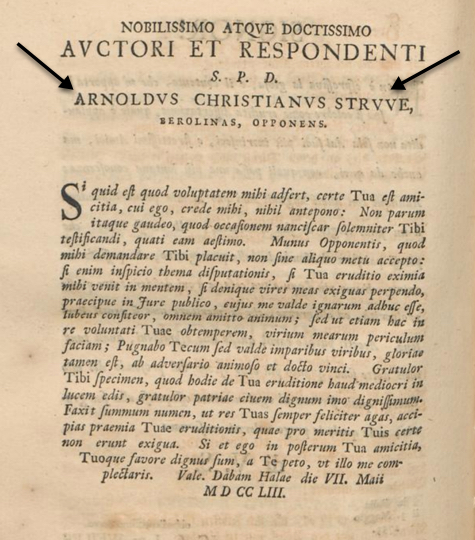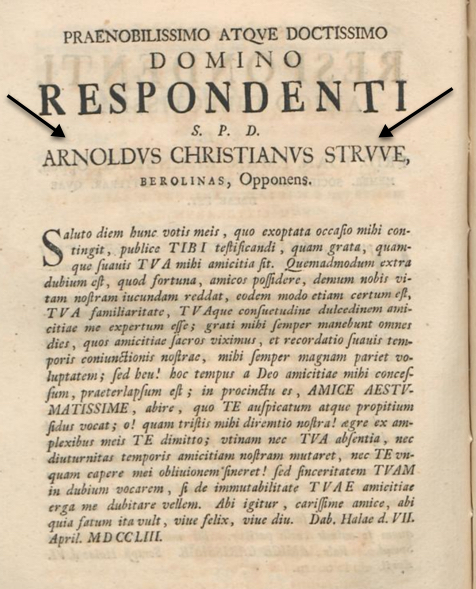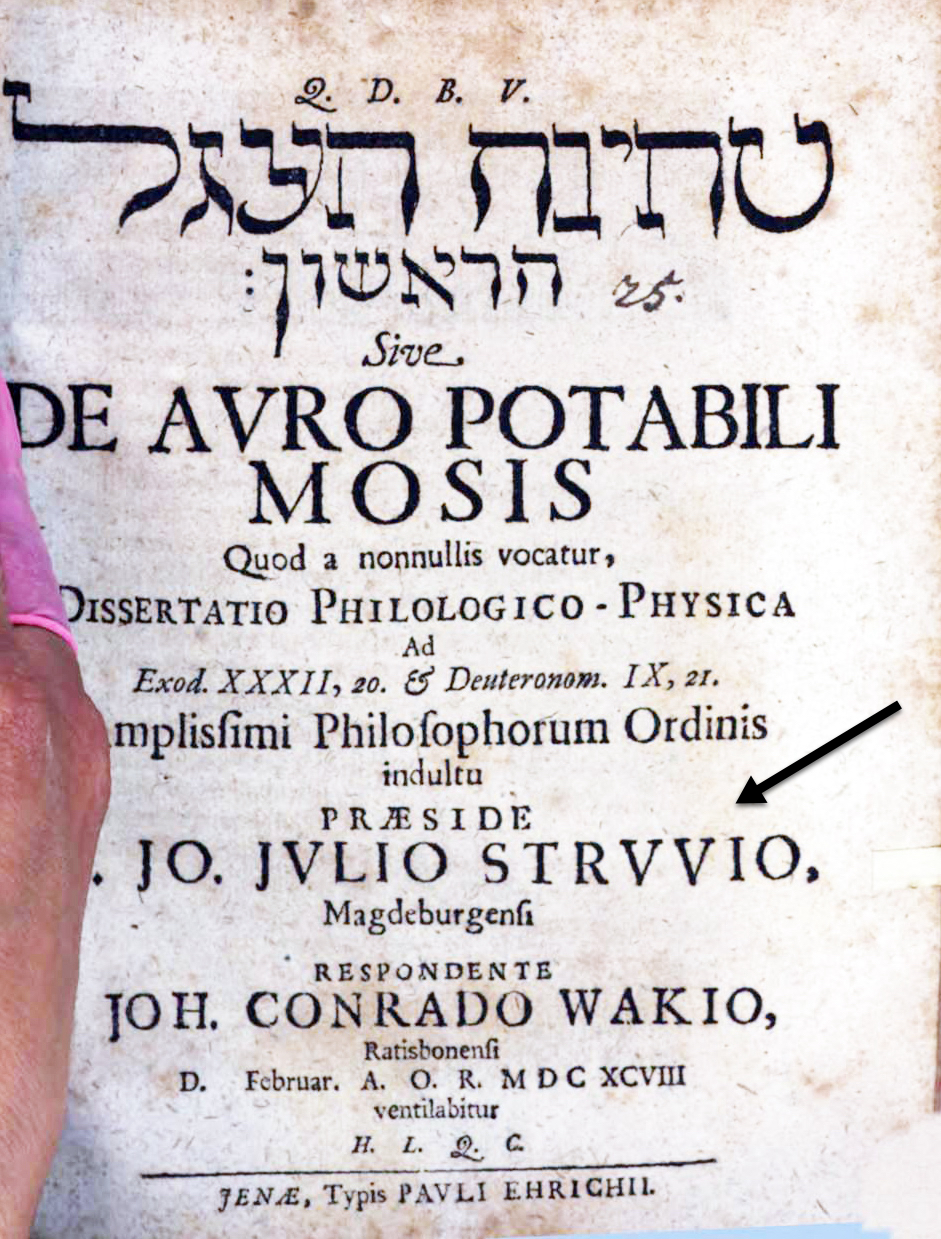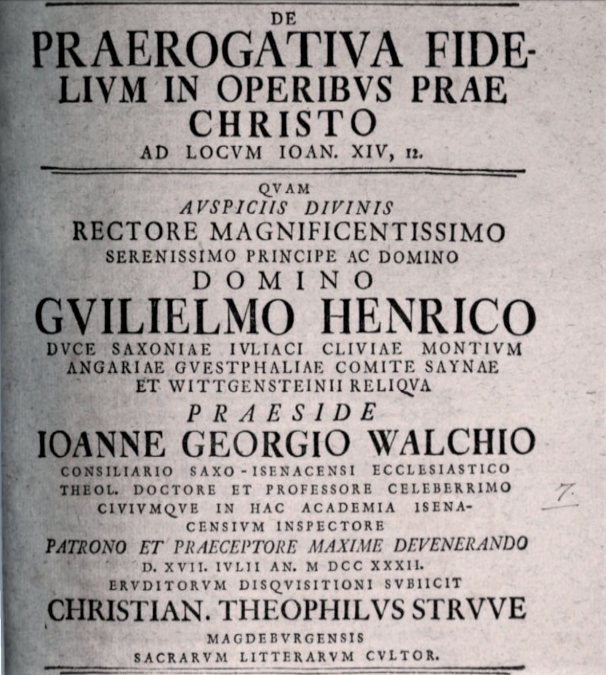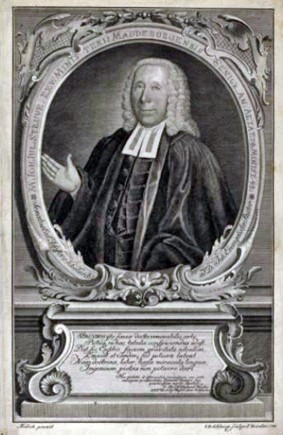
He does not appear in any of the standard genealogies but we know he was the son of Johann August Struve .
He served in Magdeburg as primary pastor at the Johannis church adn as such he produced a number of works shown below.
0n 24th April 1703 he married Maria Catharina Röber, the daughter of Johann Röber, who was the pastor of St Johannis church at Magdeburg. Johann was the pastor there from 1694 – 1704. On the occasion of his marriage to Maria Catharina, a book of poems titled Die Glückliche Vermählung = The Happy Marriage … was published [Wedding Poems to Johann Julius Struve, Deacon to St. John’s in Magdeburg and Maria Catharina Röber, daughter of Johannis Roeber, Pastor to St. John’s in Magdeburg, 24 Apr. 1703].
There are no indications on any genealogical databases that Johann Julius and Maria Catharina had children except maybe the bibliographic record which indicates that a Christian Theophil Struve made a contribution to Johann Julius’s funeral book (see the bottom of this page).
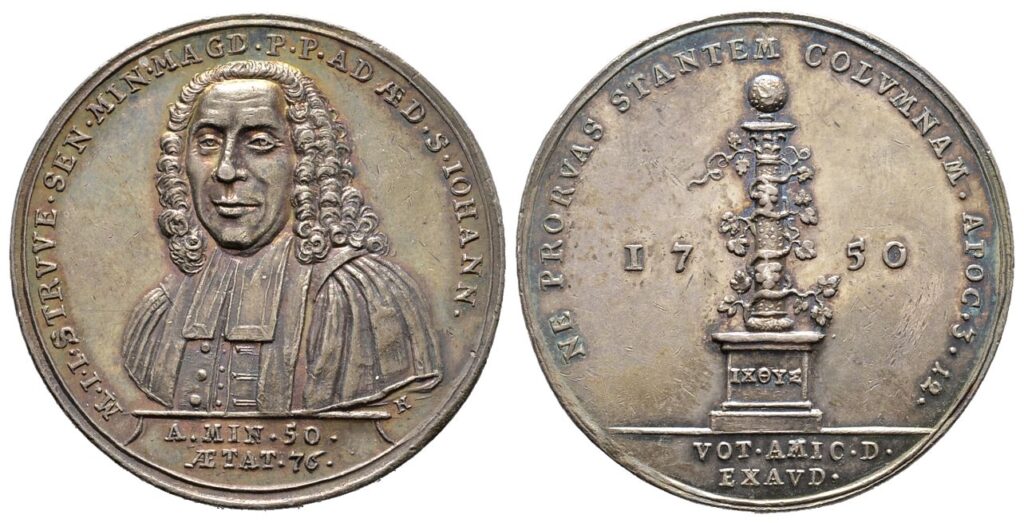
Struve wrote the forward for a ‘complete song-book’, containing 1000 songs, which had been originally issued in 1596 at Magdeburg, as well as an “edifying prayer-booklet” consisting of 39 pages for every morning and evening, as well as Beym’s service in church, and confession and communion, as well as for blessing professional work, consolation for tribulation, as well as in heavy thunderstorms. [Title: Collection of Some Wise Prayers …] promoted to print.

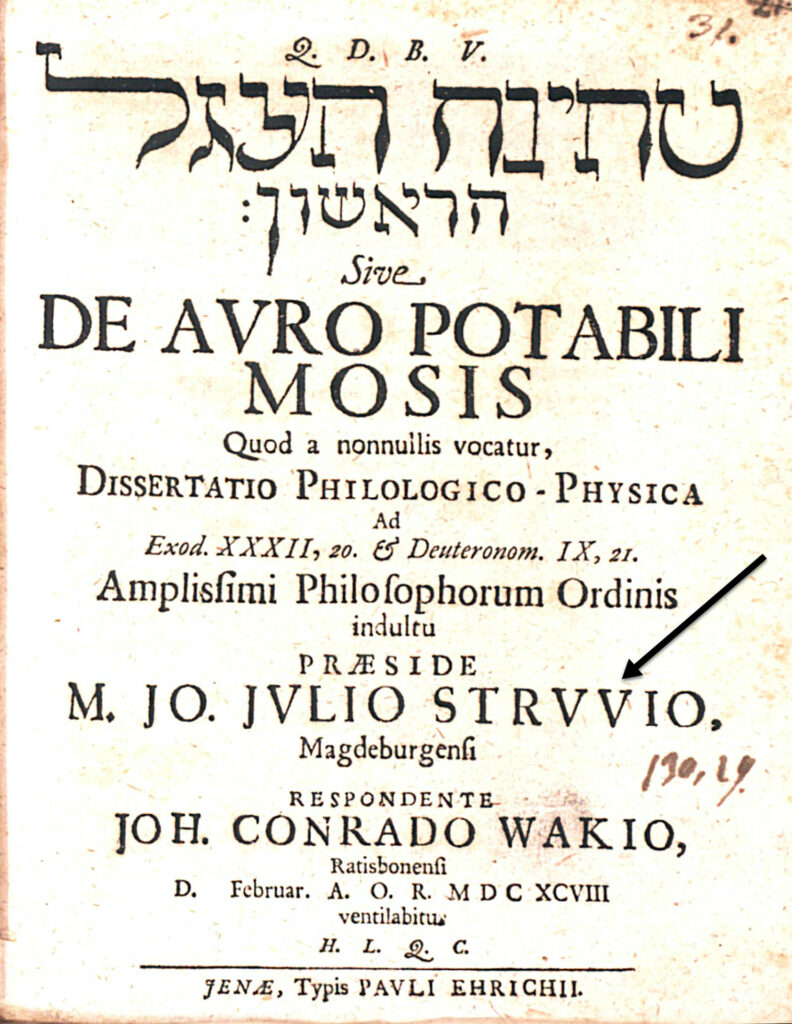
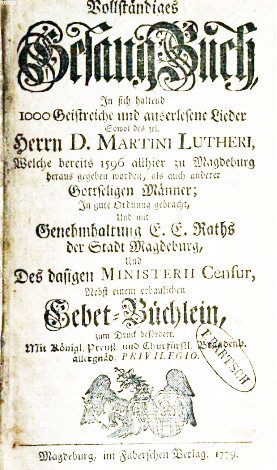
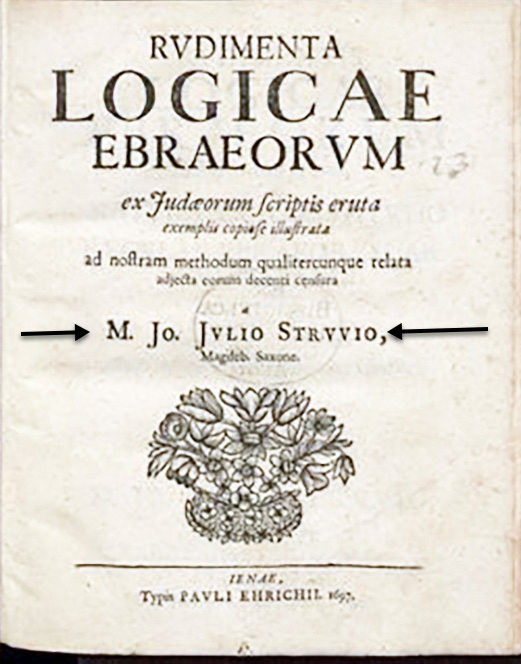
Johann Julius Struve studied at Jena (1692) and Halle (1695). In 1700 he became a Deacon, in 1703 an Archdeacon. When his father in law died, Struve took over the position he had held and was the pastor at St Johannis from 1704 to 1753.
Initially he was Home schooled and then in 1686 he attended the cathedral school in Magdeburg. On May 17, 1690 early matriculation at the University of Jena. 1691 and attendance at the grammar school in Halle. In 1692 he studied at the University of Jena and at the University of Halle. 1695 Magister. 1698 he journeyed to the Netherland and in 1699 he went to England and back. In 1700 he was appointed deacon, 1703 archdeacon, 1704 senior pastor at St. John’s Church in Magdeburg, senior of the ministry of preachers, and assessor of the ecclesiastical court.
Other works by Johann Julius include:
When the student, Johann Peter Gehse, toured Germany with his “Stammbuch” he visited Magdeburg where he managed to convince Johann Julius to give him his autograph (lower right).
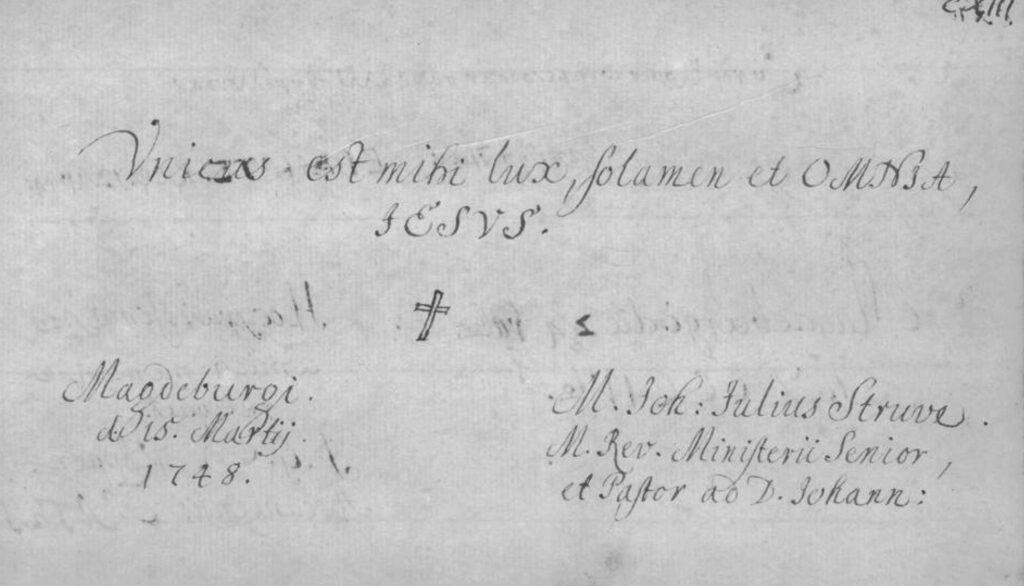
Below is: De auro potabili Mosis … Right, Das Gedächtnis der Magdeburgischen Reformation …
Below, in 1739 a book was published under the title: Die Getroste Hertzhafftigkeit Der Rechtschaffenen Israeliten, Hatte Aus Dem 2. Buch Mose Cap. 14, V. 13. Als Erwähltem Leichen-Texte Des Hoch-Ehrwürdigen Und Hochgelahrten … which was a funeral service supervised by Johann Julius on behalf of the “… most well-educated Friedrich Gottlieb Kettner, a well-deserved adjunct pastor at the church of St. Johannis Evangelist an office that he held for 33 years and which he faithfully led, and after some long-term suffering, he gave up on the 29th January 1739, and was buried on February 1st. etc.”

In 1693, Johann Julius contributed to an inventory of coins made by Johann Andreas (1652-1726) Schediasma de numis cathedraticis … And (right) Unsers Herrn Jesu Hochheiliges Abendmahl …
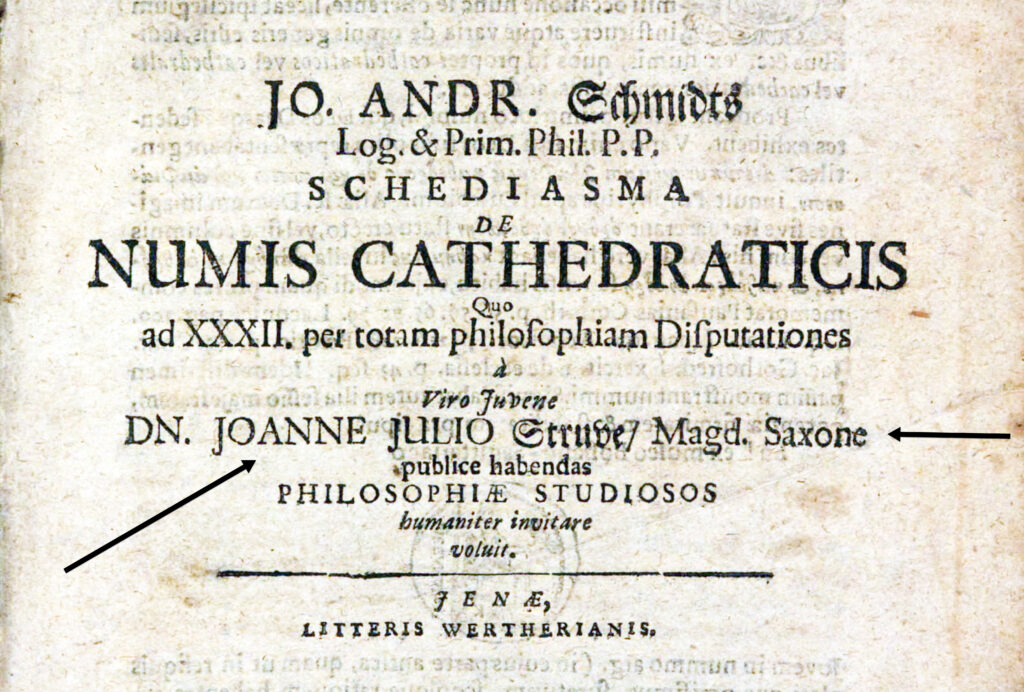
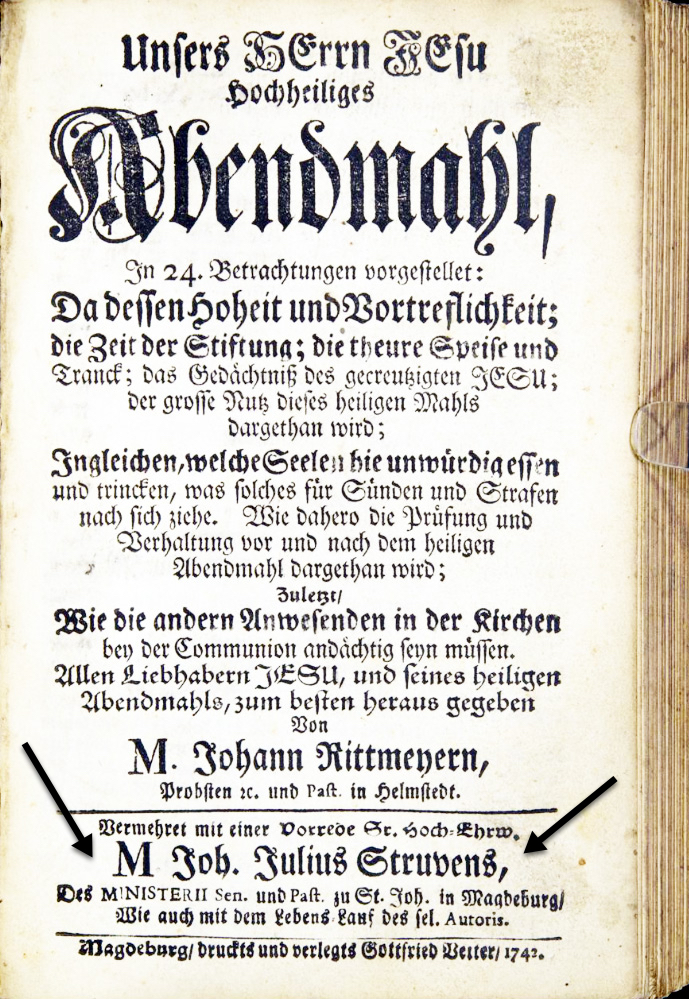
Below, Der begnadigte Aschenhauffe zu Nain Wurde Nach der in Michaelis Nacht 1718. im Kirch-Spiel St. Johannis allhier entstandenen Grossen Feuers-Brunst. His Ṭeḥînat hā-ʻēgel hā-rîšôn Sive De Avro Potabili Mosis Quod a nonnullis vocatur, Dissertatio Philologico-Physica : Ad Exod. XXXII, 20. et Deuteronom. IX, 21 has yet to be digitized. Among his other works was: Magdeburgische Huldigungs-Predigt darinn das Gott-gefällige Frohlocken über einen …
On the 1st Sunday of Advent in 1740 Struve published a “cheering sermon” to celebrate what he called “the greatest gift of the Son of God into the world” and “when the art of printing was invented three hundred years ago” Published as: Jubel-Predigt, in welcher von dem allergrösten Geschenck des Sohnes Gottes in die Welt … gehandelt wird, als das [not yet digitized]
A person who not only produced in the secondary college at Halle pre-eminent examples of learning and good behavior, but who, as soon as he entered our lecture halls, permitted no day, no hour, to pass without some work in mathematics and some written work. A person whom so many mental pictures of the most famous names in the Struve family did not inspire towards all that was best, but where [i.e. in whom] God, with generous hand, placed special gifts which we usually attribute to nature. And there are at hand examples of comrades who once adorned our Academy and who, now absent, still inflame with virtuous emulation the minds of those now present.
Every age will speak of our Claude [?] Bohmbrus who is currently in the Academy at Helmsted, itself a most celebrated active centre of the liberal arts. He is a highly deserving Professor of Moral Philosophy, publicly championing by outstanding efforts from his Chair the whole of philosophy. [These efforts] have enlivened many people to attempt [intellectual] things that are not always on a matching level but, nevertheless, on a similar level.
To this end [of championing the whole of philosophy] he has chosen as content Logic, which he will put on public display in six disputations, Metaphysics in five disputations, Physics [Natural Philosophy] in seven disputations, Natural Theology in six disputations, Ethics in four disputations, and Political Philosophy in four disputations. Be present, therefore, however many of you, to support our studies and those of a most famous Master of Debate; and be strongly persuaded that, if you have frequently attended these exercises, these efforts will be beneficial to your studies as well. Having moved forward into more excellent days, you will discover how, in the learning of my Master [of Debate], there will be in this way the most excellent days devoted to you in the swiftness of [intellectual] movement backwards and forwards.
And, if you are able also to have me promise something or other to you – and if I am to be yours – I will have stated everything if I have made my statement from the heart.
Farewell. 1st Sunday after Trinity [Sunday] 18th June, 1693.
When Johann Julius Struve died in May 1750, a funeral sermon was published under the title M. Johann Julius Struvens, E. Hoch-Ehrwürdigen Ministerii der alten Stadt Magdeburg Senioris … Danck- und Jubel-Predigt, Da Er in der Woche vor dem heil. Pfingst-Fest 1750. durch Gottes Gnade Funfzig Jahre in seinem Predigt-Amte erfüllet hatte, gehalten am 14ten Maii, 1750.
The book has not yet been digitized but there are two contributors: Christian Theophil[us] Struve and Arnold Christian Struve. Although these two individuals are not indicated on any genealogical databases, the bibliographic records that they left behind is evidence nonetheless of their existence. Furthermore, the fact they contributed to Johann Julius’s Funeral book would suggest that they were probably his sons or a son and a grandson. The possibility of son and grandson of Johann Julius arises because Christian Theophilus defended his thesis in 1732 (his parents were married in 1703) while Arnold Christian did so in 1753. Arnold Christian matriculated at the University of Jena in 1730 and is shown in the matriculations from Magdeburg.
Another funeral book that has been digitized was published under the title: Als der Hochw. Herr H.M. Jo. Jul. Struve sein Amts-Jubilaeum am 14. May 1750 …

Some members of the Struve family are missing on all the genealogical databases and their existence is only detectable through the bibliographic record they left behind. What follows are some examples of such ‘Missing Struves’.
The bibliographic record left behind by Christian Theophilus Struve would suggest that CTS was a resident of Magdeburg.
The bibliographic record left behind by Arnold Christian Struve are: Nettelbladt, D., Eisenberg, F. J. E., Maydell, G. G., Sellentin, F. G. A., Weiler, C. C. J., Struve, A. C., Lüdke, F. G., … Schüler, J. A. (1753). Dissertatio Ivris Gentivm De Forma Litterarvm Credentialivm Legatorvm. Halae Magdeb: Hilliger.
And, in 1753 Arnold Christian Struve made a one-page contribution to De Testamento Nvncvpativo In Scriptvram Redacto … and also Dissertatio Ivris Gentivm De Forma Litterarvm Credentialivm Legatorvm …
Other than these bibliographic fragments nothing more is known of their lives.
